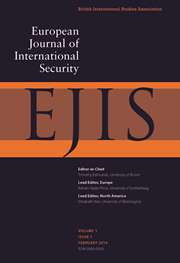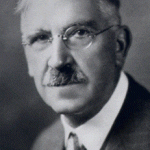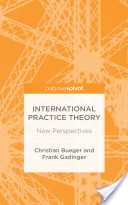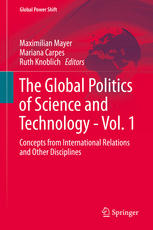In a new blog post published with Piracy-Studies.org – The Research Portal for Maritime Security I discuss the future of the Contact Group on Piracy off the Coast of Somalia (CGPCS). The CGPCS is the core global governance mechanism by which the fight against Somali piracy is coordinated and I have studied it extensively in the frame of the CGPCS lessons learned project. In the blog I discuss the advantages and disadvantages of three options that have been articulated by the international community: Extend the work to cover either other regions, or other threats, or further streamline it. Please read the full blog here.
Category Archives: Publications
First Issue of European Journal of International Security published
 Today the first issue of the brand new European Journal of International Security (EJIS) went online.
Today the first issue of the brand new European Journal of International Security (EJIS) went online.
EJIS is the new flagship journal of the British International Studies Association published with Cambridge University Press. The editorial team consists of colleagues from the GW4, with Tim Edmunds (Bristol) in the lead. Together we have been working for a year to get the journal up and running. Continue reading
Forum on Practice Turn published
 The forum discussing the future of the practice turn in International Relations has just been published by the International Studies Quarterly (ISQ) Blog and is available here. The forum takes our 2015 ISQ article titled “The Play of International Practice” as the starting point and then centers on the question what the promises of practice theoring in IR are. The forum includes contributions by Emanuel Adler and Vincent Pouliot, Rebecca Adler-Nissen and Ole Jacob Sending as well as a response by Frank Gadinger and me.
The forum discussing the future of the practice turn in International Relations has just been published by the International Studies Quarterly (ISQ) Blog and is available here. The forum takes our 2015 ISQ article titled “The Play of International Practice” as the starting point and then centers on the question what the promises of practice theoring in IR are. The forum includes contributions by Emanuel Adler and Vincent Pouliot, Rebecca Adler-Nissen and Ole Jacob Sending as well as a response by Frank Gadinger and me.
Paper on practice turn in IR now in print.
 What are the promises of practice theory for the study of global politics? The paper titled “The play of international practices” co-authored with Frank Gadinger explores this question. It is now out in International Studies Quarterly 59(3). It is available as open access here. This is the abstract:
What are the promises of practice theory for the study of global politics? The paper titled “The play of international practices” co-authored with Frank Gadinger explores this question. It is now out in International Studies Quarterly 59(3). It is available as open access here. This is the abstract:
The core claims of the practice turn in International Relations (IR) remain ambiguous. What promises does international practice theory hold for the field? How does the kind of theorizing it produces differ from existing perspectives? What kind of research agenda does it produce? This article addresses these questions. Drawing on the work of Andreas Reckwitz, we show that practice approaches entail a distinctive view on the drivers of social relations. Practice theories argue against individualistic-interest and norm-based actor models. They situate knowledge in practice rather than “mental frames” or “discourse.” Practice approaches focus on how groups perform their practical activities in world politics to renew and reproduce social order. They therefore overcome familiar dualisms—agents and structures, subjects and objects, and ideational and material—that plague IR theory. Practice theories are a heterogeneous family, but, as we argue, share a range of core commitments. Realizing the promise of the practice turn requires considering the full spectrum of its approaches. However, the field primarily draws on trajectories in international practice theory that emphasize reproduction and hierarchies. It should pay greater attention to practice approaches rooted in pragmatism and that emphasize contingency and change. We conclude with an outline of core challenges that the future agenda of international practice theory must tackle.
New book chapter on ANT available as pre-print
Our introductory text to Actor-Network Theory is available as pre-print. The chapter titled “Actor-Network Theory. Objects and Actants, Narratives and Networks” is authored jointly with Jan Stockbruegger. It is forthcoming in “Technology and World Politics: An Introduction”, edited by Daniel R. McCarthy (Abingdon: Routledge) which is a textbook for advanced graduate students. In the chapter we provide a succinct introduction to Actor Network Theory (ANT) and how it has been discussed in International Relations. Arguing that ANT offers “empirical theory” we review a range of classical ANT studies and discuss what concepts they develop. We continue in exploring what one can “do” with ANT to study international relations and global politics. The chapter is available through my Academia page, and can be accessed here.
‘The Play of International Practice’ now online as first view
 A new article co-authored with Frank Gadinger which introduces international practice theory and offers some much needed clarification of its premises is now available as online first with International Studies Quarterly. The article is available as open access and can be downloaded here. The article is the outcome of a multi-year collaboration and summarizes a number of the core insights of our recently published book “International Practice Theory” (Palgrave MacMillan, 2014). Here is the article’s abstract:
A new article co-authored with Frank Gadinger which introduces international practice theory and offers some much needed clarification of its premises is now available as online first with International Studies Quarterly. The article is available as open access and can be downloaded here. The article is the outcome of a multi-year collaboration and summarizes a number of the core insights of our recently published book “International Practice Theory” (Palgrave MacMillan, 2014). Here is the article’s abstract:
“The core claims of the practice turn in International Relations (IR) remain ambiguous. What promises does international practice theory hold for the field? How does the kind of theorizing it produces differ from existing perspectives? What kind of research agenda does it produce? This article addresses these questions. Drawing on the work of Andreas Reckwitz, we show that practice approaches entail a distinctive view on the drivers of social relations. Practice theories argue against individualistic-interest and norm-based actor models. They situate knowledge in practice rather than “mental frames” or “discourse.” Practice approaches focus on how groups perform their practical activities in world politics to renew and reproduce social order. They therefore overcome familiar dualisms—agents and structures, subjects and objects, and ideational and material—that plague IR theory. Practice theories are a heterogeneous family, but, as we argue, share a range of core commitments. Realizing the promise of the practice turn requires considering the full spectrum of its approaches. However, the field primarily draws on trajectories in international practice theory that emphasize reproduction and hierarchies. It should pay greater attention to practice approaches rooted in pragmatism and that emphasize contingency and change. We conclude with an outline of core challenges that the future agenda of international practice theory must tackle.”
From Dusk to Dawn? Maritime Domain Awareness in South East Asia
 On the of 22 April 2015 (Wednesday) I will give a talk on my ongoing research on maritime domain awareness and information sharing in South East Asia at the seminar series of the Center for International Law of NUS.
On the of 22 April 2015 (Wednesday) I will give a talk on my ongoing research on maritime domain awareness and information sharing in South East Asia at the seminar series of the Center for International Law of NUS.
Here is the abstract:
“Information Sharing and Maritime Domain Awareness (MDA) are at the heart of the contemporary maritime security agenda. The goal of MDA is to develop shared understandings of developments and threats at sea. This provides one of the preconditions for coordination and cooperation between the diverse maritime security agencies. In this seminar, Dr Bueger will present his paper on the organisation of MDA in the South East Asian region. He argues that MDA is not only a technical challenge, but also a social, political and legal one. Three South East Asian MDA and Information Sharing centres will be discussed in light of these challenges. The political and social functions these centres perform in the governance of maritime security in the region will be explored. The conclusion outlines what lessons the South East Asian system suggests for organising MDA in other regions, including the Western Indian Ocean and West Africa and the rise of a cooperative security culture.”
Further information is available on the CIL website. You can download the full draft paper here.
An Interview with John Dewey, pre-version published
 As part of the project “The return of the theorists” by Richard Ned Lebow, Hidemi Suganami and Peer Schouten I have written together with Peer Schouten a virtual interview with pragmatist thinker John Dewey. In the interview we discuss with Dewey, about his understanding of knowledge production and methods, politics, and language games. The interview is published as Theory Talks interview #100. Please read the full version here.
As part of the project “The return of the theorists” by Richard Ned Lebow, Hidemi Suganami and Peer Schouten I have written together with Peer Schouten a virtual interview with pragmatist thinker John Dewey. In the interview we discuss with Dewey, about his understanding of knowledge production and methods, politics, and language games. The interview is published as Theory Talks interview #100. Please read the full version here.
Book on International Practice Theory published
 The book International Practice Theory: New Perspectives has now been published. It is co-authored with Frank Gadinger. Together we discuss what practice theory is, how it fits into international relations theory and explore core approaches and challenges with a particular emphasis on methodology. Here’s the official blurb
The book International Practice Theory: New Perspectives has now been published. It is co-authored with Frank Gadinger. Together we discuss what practice theory is, how it fits into international relations theory and explore core approaches and challenges with a particular emphasis on methodology. Here’s the official blurb
International Practice Theory has become one of the core perspectives in International Relations. Since the practice turn, there has been significant interest in developing new theories and methodologies for understanding world politics and global governance. This unique study reviews these new approaches, offering a focused discussion of the strategies, techniques and issues. Examining how International Practice Theory is linked to social theory and international relations theory, Bueger and Gadinger explore Bourdieu’s praxeology, the community of practice approach, narrative approaches, Actor-Network Theory and Boltanski’s pragmatic sociology to address core questions of transformation, scale, normativity and materiality. Advocating greater attention to translating International Practice Theory into empirical research, this book will be a valuable resource for all those interested in social theory, practice theory and the international.
A preview of the book is available here.
Chapter on the role of expertise in IR published
 My book chapter which discusses the different way of how expertise in international relations has been studied is now available in print and online as part of the Handbook “The Global Politics of Science and Technology”. It will be an interesting read for anyone interested in the role of experts, politics and knowledge production as well as international organizations. The chapter provides an historical overview and argues that there are three generations of studying expertise in international relations.
My book chapter which discusses the different way of how expertise in international relations has been studied is now available in print and online as part of the Handbook “The Global Politics of Science and Technology”. It will be an interesting read for anyone interested in the role of experts, politics and knowledge production as well as international organizations. The chapter provides an historical overview and argues that there are three generations of studying expertise in international relations.
The role and functions of expertise in international politics is, since decades, a core research theme. This chapter outlines a history of how the relation between science and international politics has been approached through the lenses of expertise. My intention is to offer a heuristic device. I argue that the debate can be structured in three generations. A first generation is interested in experts as actors that have a causal influence on international politics. The second generation scrutinizes discourses of expertise and their constitutional role in making the international. And the third generation concentrates on practices of expertise and the way these perform the epistemic arrangements of the international. To think about the study of expertise in the frame of three generations each offering different insights and carrying advantages and problems provides not only a practical tool for sorting ideas, but clarifies what one ‘buys in’ by following a specific generation.
The chapter is either available here or as pre-print here.